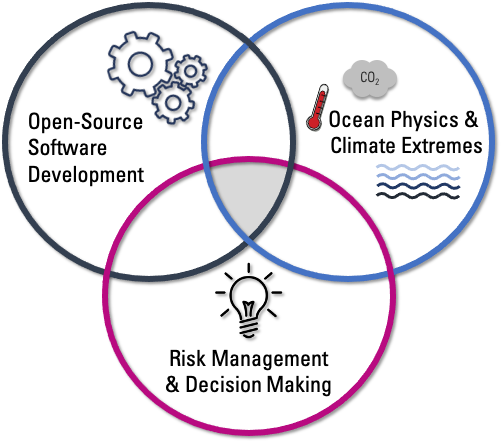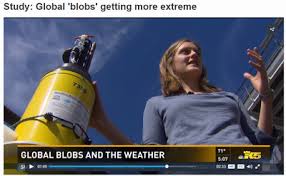What Motivates My Work

I find it really interesting to think about human impacts at the crossroads of two unprecedented ages: the Information Age and the Anthropocene. Global economies are increasingly technology centric and the production and consumption of data is growing exponentially. Meanwhile, the negative impacts of human activities on Earth have inevitably defined a new geologic age. This motivates my research to leverage and innovate new data-driven technologies to address modern environmental challenges.
In November 2020, I received my PhD from the School of Oceanography at the University of Washington under the advisement of LuAnne Thompson. My dissertation focused on the spatiotemporal evolution of marine heatwaves globally and developed a novel tracking algorithm called Ocetrac to characterize dangerous marine heatwaves.
After my PhD, I worked as a Postdoctoral Research Scientist in the Climate Data Science Lab at Columbia University's Lamont-Doherty Earth Observatory under the advisement of Ryan Abernathey. I worked on a variety of open-source python projects, including pyqg, and developed a large ensemble of simulated Lagrangian Coherent Structures in a two-layer quasigeostrophic turbulent system.
News & Updates
18 June 2020: AI for Earth Innovation Grant Supports Marine Heatwave Research. Our proposal to track and forecast dangerous marine heatwaves was selected among 135 globally to receive one of five AI for Earth Innovation Grants from Microsoft-Global Wildlife Conservation and the Leonardo DiCaprio Foundation. Check out the official press release and the UW College of the Environment announcement.28 Jan 2020: Received an Advanced Studies Program (ASP) Graduate Visitor Fellowship at the National Center for Atmospheric Research in Boulder, Colorado. I will be working with Daniel Whitt and David John Gagne to use machine learning to track marine heatwaves in large climate model datasets.
13 Nov 2019: Awarded Microsoft AI for Earth grant to study marine heatwaves. Marine heatwaves are becoming ubiquitous features of our changing oceans that seem to reoccur in some regions more frequently than others. Why, you might ask? To answer this we proposed to use Microsoft Azure to integrate AI tools with petabyte-sized climate model data to identify and map ocean regions most susceptible to marine heatwaves in past, present, and future climates.
27 May 2018: Thrilled to be selected as one of the recipients of the 2018 Integral Consulting Inc. Environmental Big Data Research Fellowship.
15 Nov 2017: Featured in The Oceanography Society Student News where I talk about my involvement in planning the 2016 Graduate Climate Conference and the impact this experience had on my graduate training.
16 Aug 2017: Our Policy Brief on Climate Change Wins International Competition in The New York Times! We proposed a framework to bring together Washington, Oregon and California to improve harmful algal bloom prediction, information sharing, economic mitigation and response. The overall goal of our policy brief was to continue to protect public health while sustaining vibrant West Coast communities. Read our submission and the press release.
1 Apr 2017: Interviewed by Seattle's KING 5 News about Marine Heatwaves. I recently caught up with KING 5 reporter Glenn Farley to discuss my research on the frequency of marine heatwaves and how the Pacific 'Blob' was destined to break records. Additional reporting here and here.

